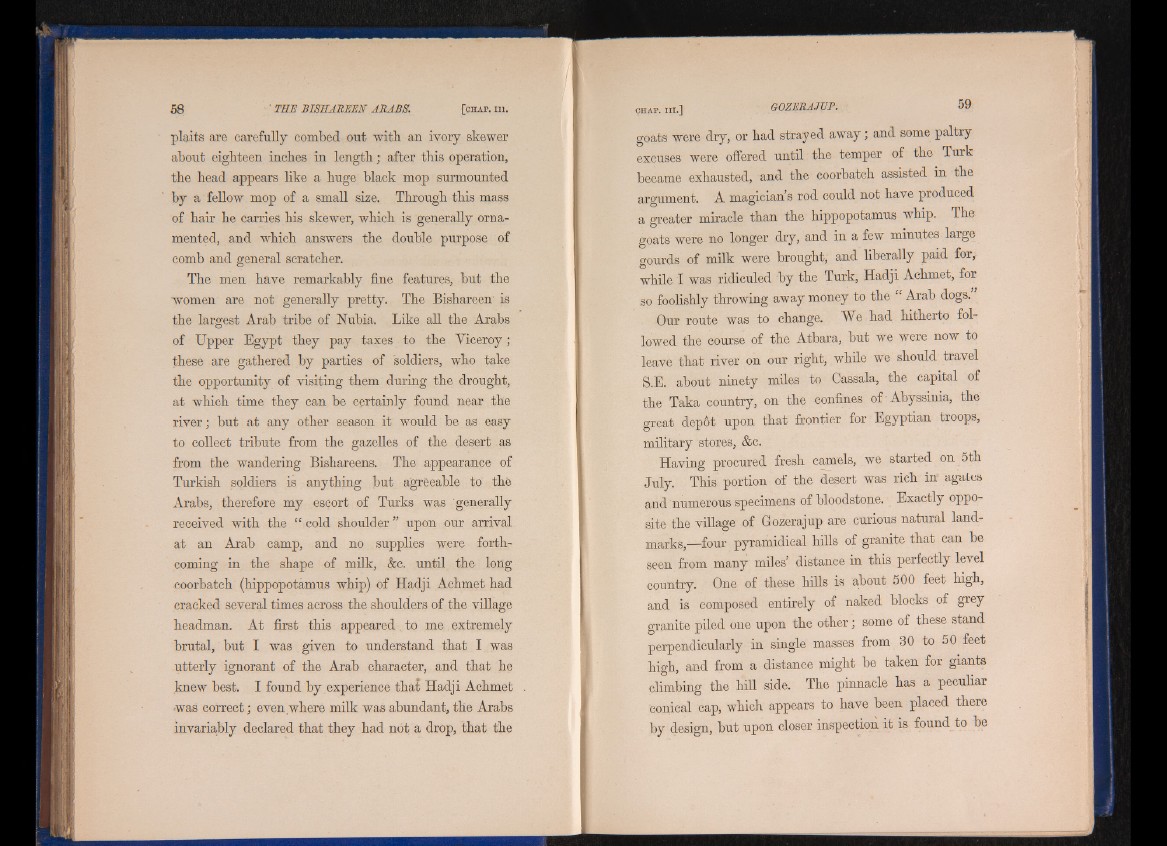
plaits are carefully combed out with an ivory skewer
about eighteen inches in length ; after this operation,
the head appears like a huge black mop surmounted
by a fellow mop of a small size. Through this mass
of hair he carries his skewer, which is generally ornamented,
and which answers the double purpose of
comb and general scratcher.
The men have remarkably fine features, but the
women are not generally pretty. The Bishareen is
the largest Arab tribe of Nubia. Like all the Arabs
of Upper Egypt they pay taxes to the Viceroy ;
these are gathered by parties of soldiers, who take
the opportunity of visiting them during the drought,
at which time they can be certainly found near the
river ; but at any other season it would be as easy
to collect tribute from the gazelles of the desert as
from the wandering Bishareens. The appearance of
Turkish soldiers is anything but agreeable to thè
Arabs, therefore my escort of Turks was generally
received with the “ cold shoulder ” upon our arrival
at an Arab camp, and no supplies were forthcoming
in the shape of milk, &c. until the long
coorbatch (hippopotamus whip) of Hadji Achmet had
cracked several times across the shoulders of the village
headman. At first this appeared , to me extremely
brutal, but I was given to understand that I was
utterly ignorant of the Arab character, and that he
knew best. I found by experience that Hadji Achmet
was correct ; even.where milk was abundant, the Arabs
invariably declared that they had not a drop, that the
goats were dry, or had strayed away ; and some paltry
excuses were offered until the temper of the Turk
became exhausted, and the coorbatch assisted in the
argument. A magician’s rod could not have produced
a greater miracle than the hippopotamus whip. The
goats were no longer dry, and in a few minutes large
gourds of milk were brought, and liberally paid for,-
while I was ridiculed by the Turk, Hadji Achmet, for
so foolishly throwing away money to the “ Arab dogs.”
Our route was to change. We had hitherto followed
the course of the Atbara, but we were now to
leave that river on our right, while we should travel
S.E. about ninety miles to Cassala, the capital of
the Taka country, on the confines of -Abyssinia, the
great dépôt upon that frontier for Egyptian troops,
military stores, &c.
Having procured fresh camels, we started on 5th
July. This portion of the desert was rich in agates
and numerous specimens of bloodstone. Exactly opposite
the village of Gozerajup are curious natural landmarks,—
four pyramidical hills of granite that can be
seen from many miles’ distance in this perfectly level
country. One of these hills is about 500 feet high,
and is composed entirely of naked blocks of grey
granite piled one upon the other ; some of these stand
perpendicularly in single masses from 30 to 50 feet
high, and from a distance might be taken for giants
climbing the hill side. The pinnacle has a peculiar
conical cap, which appears to have been placed there
by design, but upon closer inspection it is found to be